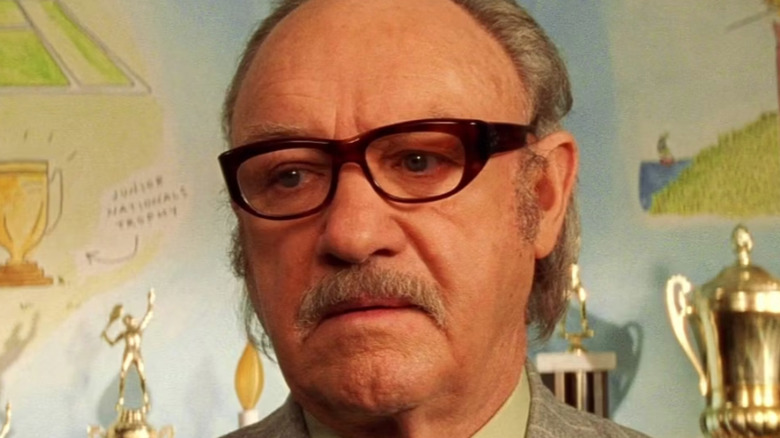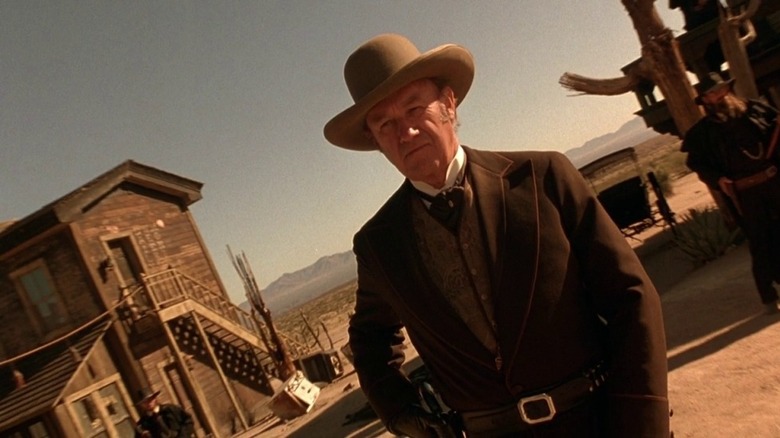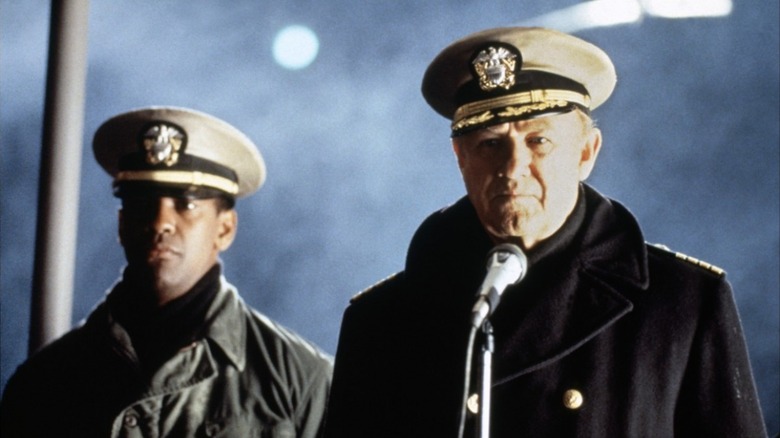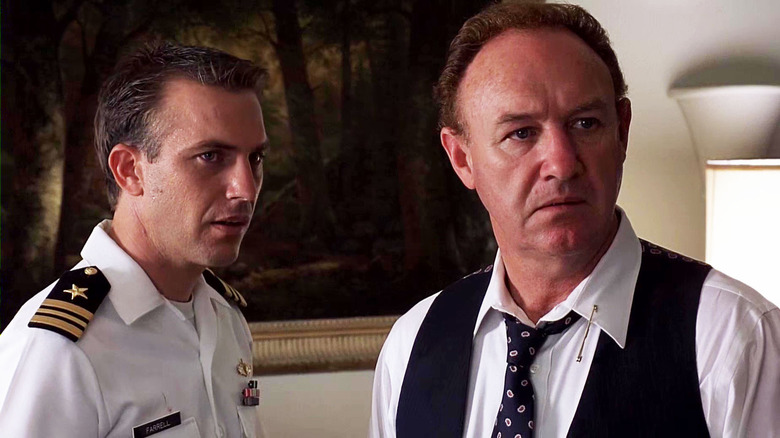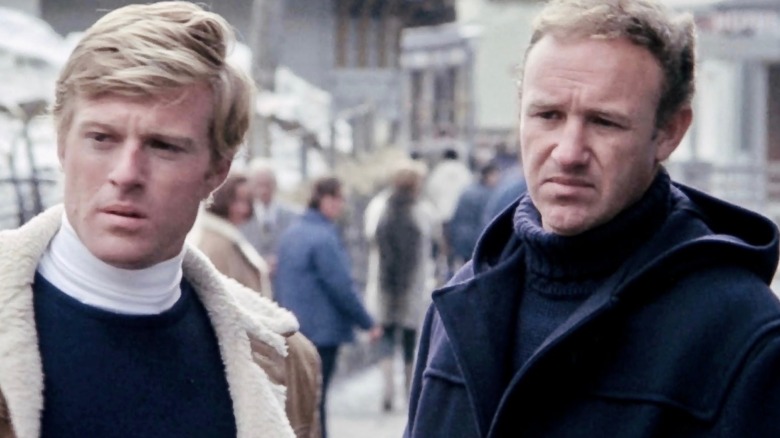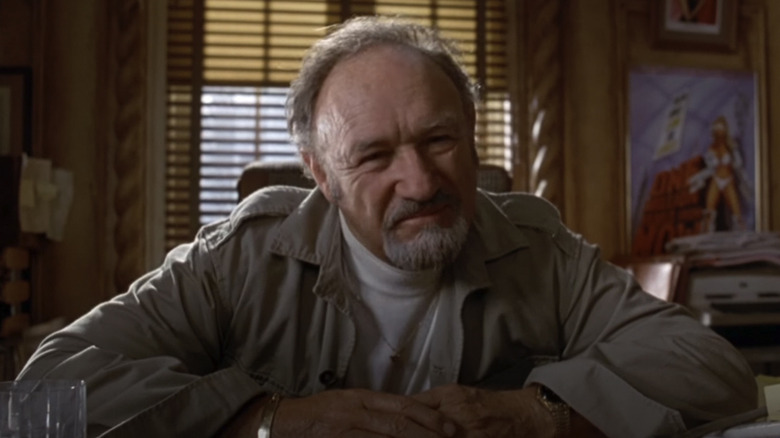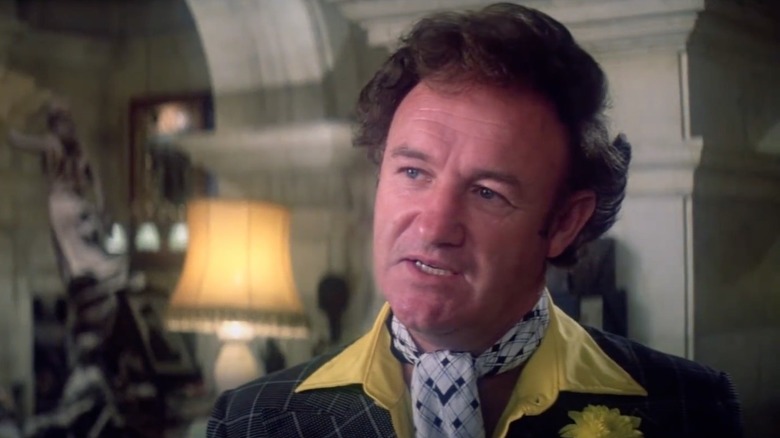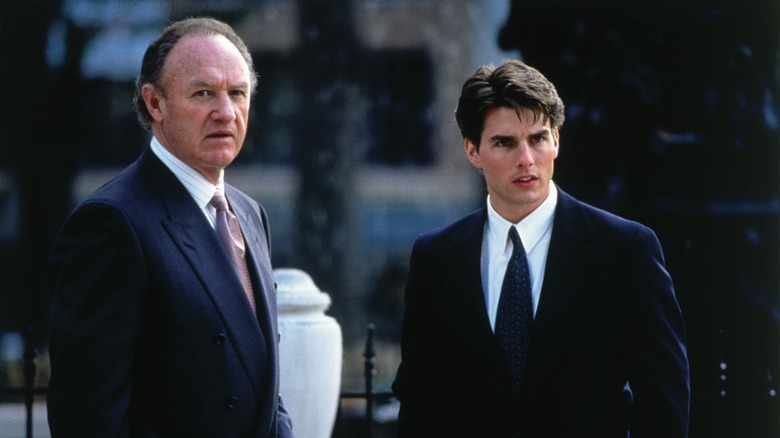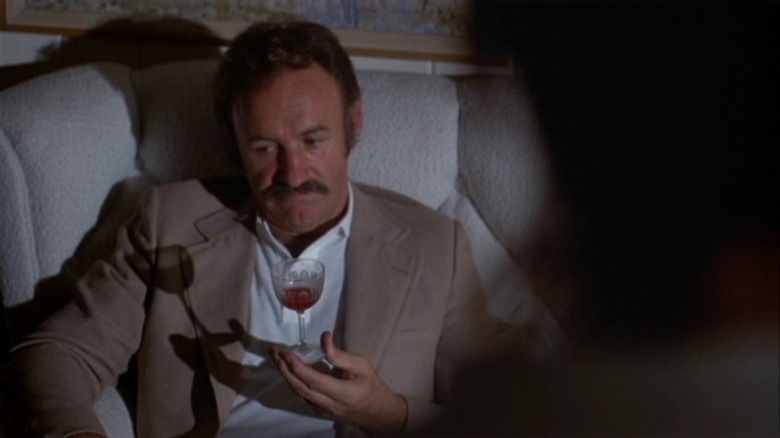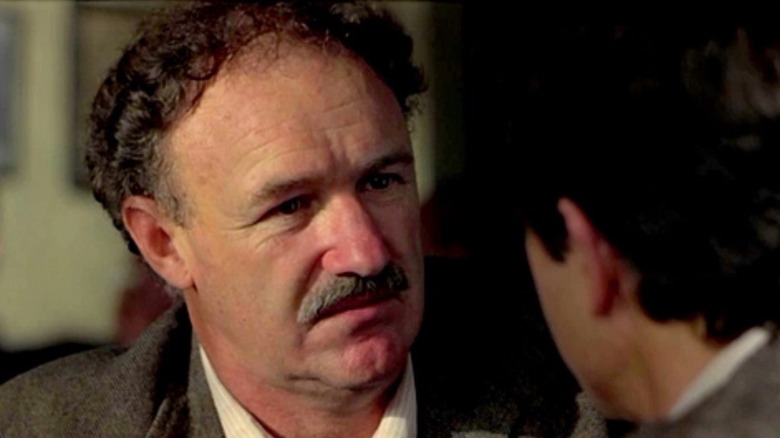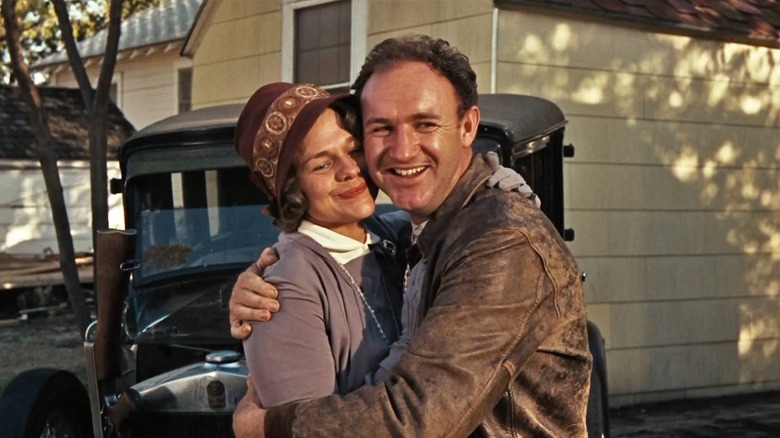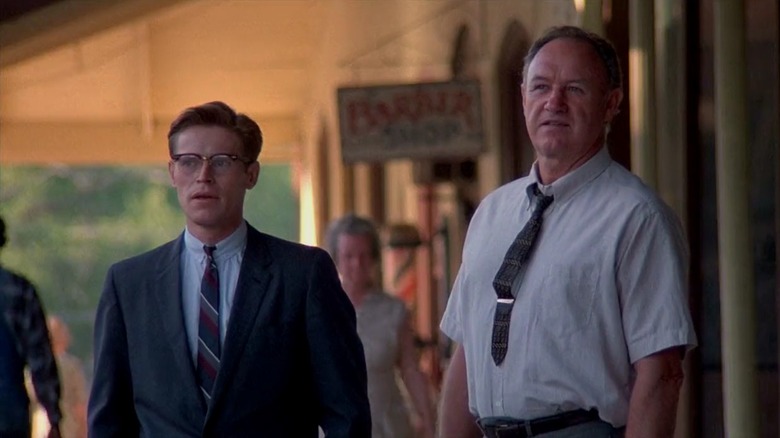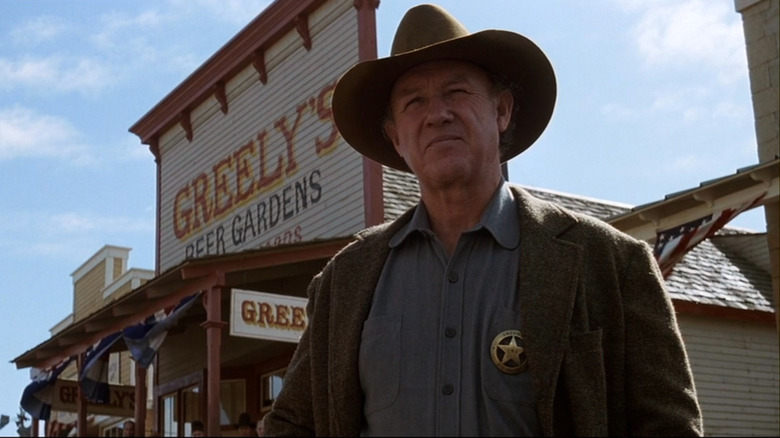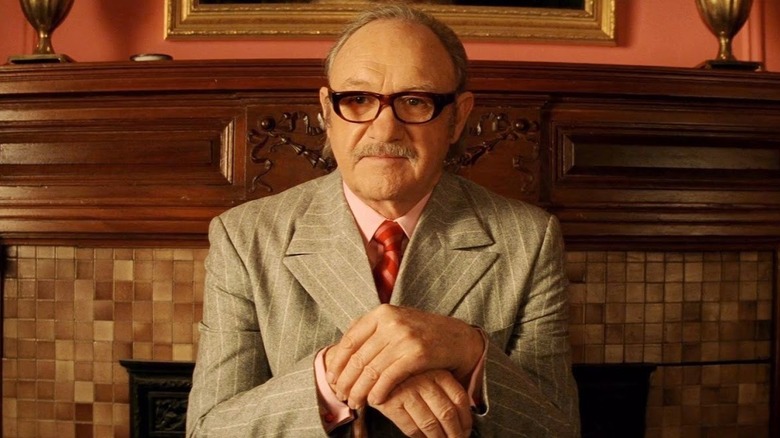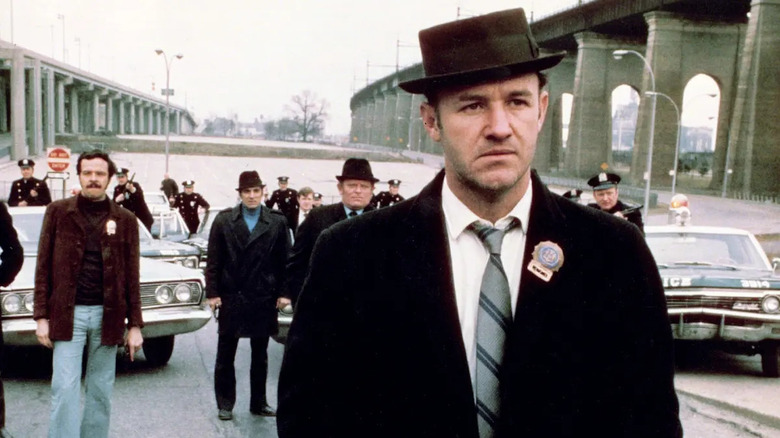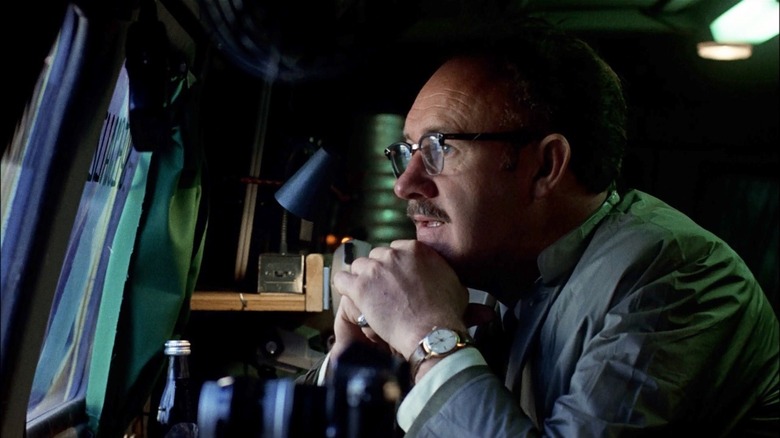The 15 Best Gene Hackman Movies, Ranked
Gene Hackman is one of the greatest actors of all time. He's also someone who has reinvented himself for many different generations. Although some great actors have never returned to the highlights of their early work, Hackman continued to prove why he was one of the best for decades after he first broke out in the industry.
Between crime thrillers, stage adaptations, quirky comedies, historical epics, and even a superhero movie franchise, Hackman has left major contributions to nearly every genre. Although Hackman clearly had a commanding dramatic presence, he wasn't afraid to take a chance on comedic roles. His single scene in Mel Brooks' 1974 classic "Young Frankenstein" is one of the most memorable moments in the film. Hackman has a consistently high quality of work, to the point that even a disastrous comedy like "Welcome to Mooseport" or a dull comic book movie like "Superman IV: The Quest for Peace" is more enjoyable because of his performance. Here are the top 15 best Gene Hackman movies, ranked.
15. The Quick and the Dead (1995)
"The Quick and the Dead" features all the gunfights and broad characters that you'd come to expect from a western, but director Sam Raimi inserts dashes of his wild sense of humor. It's clear that Raimi is bringing in elements of his horror background, but he's still remarkably sincere with his characters. Gene Hackman's performance as the ruthless outlaw John Herod is both completely menacing and utterly heartbreaking.
"The Quick and the Dead" takes place in a small community on the outskirts of the west ruled by outlaws and bandits. Herod decides to launch a "quick draw" tournament in which no participant can refuse a challenge. All duels will be continued until one of the opponents have either yielded or been killed. What Herod doesn't know is that the enigmatic wanderer known as "The Lady" (Sharon Stone) is on a personal mission of revenge, seeking to bring him to justice for a shocking incident from her past. Hackman has a great time chewing the scenery as an eccentric villain, but that doesn't mean he's not scary. The most emotional storyline in the film develops when Herod is forced to duel against his son, "The Kid" (Leonardo DiCaprio). All of The Kid's youthful energy disappears when he sees the cruelty that his father is capable of.
14. Crimson Tide (1995)
It only made sense that as one of the best actors of his era, Gene Hackman would get to welcome a new generation of stars once he got older. One of the unique things about Hackman is his ability to command the audience's attention, a quality shared by Denzel Washington. Tony Scott's 1995 thriller "Crimson Tide" explores a complex series of moral decisions made by the crew of a U.S. missile submarine. They must decide whether or not to fire, which could subsequently start a war. Captain Frank Ramsey (Hackman), the ship's commanding officer, is skeptical of his new executive officer, Lieutenant Commander Ron Hunter (Washington). Hunter is clearly a man of great intelligence, but he has never participated in an actual conflict. Ramsey feels that he does not understand how to make decisions when the life of his crew is on the line.
Watching these two great actors go toe-to-toe is simply electrifying. Both Ramsey and Hunter represent different aspects of leadership, and their conflicting beliefs divide the submarine's crew into opposing factions. What's fascinating is that at the end of the film, the audience has respect for both characters. Even though Ramsey's decisions were flawed, Hackman shows that they were not without just cause.
13. No Way Out (1987)
Gene Hackman can be utterly charming when he's playing a hero, but it's always fun to see him play a villain. Considering that he was the protagonist in many political thrillers in the 1960s and 1970s, it was interesting to see him play one of the main antagonists in the 1987 espionage film "No Way Out." The film is told in flashbacks as U.S. Navy Lieutenant Commander Tom Farrell (Kevin Costner) recounts the events that led him to meet the U.S. Secretary of Defense, David Brice (Hackman).
Farrell is cordially introduced to Brice at a party thanks to their mutual friend, Scott Pritchard (Will Patton). It's a fascinating scene to rewatch once you know the plot twist because you can see the tension that is already boiling between Farrell and Brice. Farrell's position is compromised when he begins to fall in love with the woman Susan Atwell (Sean Young), who is also having an affair with Brice. When she is mysteriously killed, Farrell suspects that Brice is the culprit. Hackman does a great job of retaining his composure when Brice's honor is questioned. It's clear that a man of his experience has had to deal with difficult situations before, and that he has learned how to mask his motivations. However, he's also remarkably vulnerable during the scenes with Young. She is able to catch him off guard, which makes their chemistry even more electrifying.
12. Downhill Racer (1969)
"Downhill Racer" is an inspirational sports film that simply does everything right. While this is a genre that has its cliches, this entry is completely focused on the characters in competition and how they are driven to pursue their passions. Based on Oakley Hall's novel "The Downhill Racers," Michael Ritchie's film follows a group of American skiers who participate in an international competition in Europe. Tensions arise within the group as the skiers' clashing personalities threaten to thrust them into chaos.
Gene Hackman delivers one of the definitive "movie coach" performances of all time as the ski group's leader, Eugene Claire. He wants to push his team to succeed but feels that the up-and-coming skier David Chappellet (Robert Redford) is too ambitious for his own good. Chappellet is narcissistic and unbearably arrogant, which sparks conflict with the other members of the team. Hackman shows the difficult position that Claire is in, recognizing Chappellet's obvious skill while reckoning with the fact that he is a liability in competition. Hackman provides a voice of reason during the climactic scenes in between the actual ski jumps. Although "Downhill Racer" features some of the most gorgeous alpine sequences ever filmed, the scenes in between the actual competitions are just as engaging.
11. Get Shorty (1995)
Although he's known for playing ruthless detectives, police officers, and members of the armed services, Gene Hackman isn't given enough credit for how funny he can be. The 1995 comedy "Get Shorty" pokes fun at gangster movie cliches from the perspective of those that have experience in the film industry. Are there any two subjects that Hackman knows more about? The film follows the Miami loan shark Chili Palmer (John Travolta), a self-described "movie buff" who is sent to collect a debt from the film director and producer Harry Zimm (Hackman). Once a respectable member of the industry, Zimm currently works on low-budget "B movies" and is saddled with personal debt. Zimm has lost his enthusiasm for film but becomes re-engaged when Chili pitches him on a story about a mobster looking for a dry cleaner's debt. What he doesn't know is that this story is based on Chili's real life.
"Get Shorty" hilariously blurs the line between film politics and gangster terminology, and satirizes how they really aren't that much different. It's hilarious to watch Zimm get thrust into Chili's schemes when his boss, the mobster Ray Barboni (Dennis Farina), flies to Los Angeles. The sequence where Ray attacks Zimm is surprisingly intense for such a comedic movie, adding tension in the third act.
10. Superman: The Movie (1978)
It's strange to think that there was once a time when superhero movies were considered to be a "risk," but back in the 1970s there was skepticism that a movie based on a comic book would be taken seriously. That all changed with Richard Donner's 1978 masterpiece "Superman: The Movie." Both inspiring and electrifying, Donner incorporates just the right amount of humor to acknowledge the character's origins.
Gene Hackman appears as the criminal genius Lex Luthor, who plans to reprogram American missiles to detonate along the San Andreas Fault. Hackman is slightly goofy and over-the-top, but that doesn't mean that Luthor's plan doesn't have real consequences. It's the first test of Superman's (Christopher Reeve) commitment to mankind: How far would he be willing to go to save a planet that will never truly accept him for who he is? Hackman's performance may be comical, but he shows the wicked cruelty of Luthor that inspires Superman to rise to the challenge.
9. The Firm (1993)
"The Firm" features one of the most surprising performances of Gene Hackman's career. Initially, it appears that his character, Avery Tolar, is one of the film's main antagonists. Later it becomes clear that Avery has done things that he is ashamed of, but that in his heart he is not a cruel person. There's a surprising complexity that Hackman brings to the character, even though he's ultimately a pawn in the larger plot. A detail like this isn't necessary to the film, but it makes it even more well-rounded.
"The Firm" follows the ace Harvard law student Mitch McDeere (Tom Cruise), who receives a generous job offer from the Tennessee law firm Bendini, Lambert & Locke. McDeere accepts the position, moving with his wife Abby (Jeanne Tripplehorn) to Memphis. After learning the ropes of the practice from the senior partner Avery, Mitch begins to suspect that there are some shady aspects to the business. He eventually uncovers a conspiracy that compromises the firm, but the senior partners are monitoring his every move to make sure that he doesn't speak up. Hackman shows that while Avery is involved in the cover-up, he is not a bad man. There is a brilliant scene where Abby attempts to seduce Avery in order to gain sensitive information. It's a beautiful moment where both characters open up to one another, with Abby still angry with her husband for having an affair and Avery riddled with guilt.
8. Night Moves (1975)
When people say "they don't make them like this anymore," they're probably talking about movies like "Night Moves." Arthur Penn's relentlessly entertaining 1975 neo-noir mystery is the type of hard-edged thriller that the industry simply doesn't churn out today. Gene Hackman gives one of the best performances of his career as the private investigator Harry Moseby. Once a professional football player, Harry's detective career declined and his wife Ellen (Susan Clark) had an affair.
There is a deep sadness in the way that Hackman characterizes Harry, using his sharp wit as a defensive mechanism even though he is clearly unhappy about the state of his life and career. Harry is called in to investigate a new case when the teenage girl Delly Grastner (Melanie Griffith) goes missing. Hackman shows how this case both brings Harry back from the brink while reminding him about the inherently cruel nature of the world.
7. Reds (1981)
Warren Beatty's 1981 masterpiece "Reds" is one of the most important movies ever made. The film features an unparalleled account of the rise of the Communist movement in Russia and explores a message about the importance of good journalism that is more timely than ever. While there is always a risk that telling a story like this from an American perspective could be deemed disrespectful, "Reds" shows how reporter Jack Reed (Beatty) devotes his career to covering this moment of change.
"Reds" is over three hours long and features many brilliant supporting performances from some of the industry's best actors, including Jack Nicholson, Diane Keaton, Paul Sorvino, and Edward Herrmann. Gene Hackman appears as one of Reed's editors, Pete Van Wherry. Although it's not a scene-stealing performance, Hackman shows the professionalism of a man who has been in the business for a long time. He gives Reed the type of tough advice that he doesn't want to hear.
6. Bonnie and Clyde (1967)
It wouldn't be an overstatement to say that "Bonnie and Clyde" changed the film industry forever. The film's unflinching ability to show sexual content, violence, and satirical depictions of the media made it one of the most influential films of its era. It subsequently launched the "New Hollywood" generation of actors, writers, and directors. There are many commendable performances in the film, but Gene Hackman's role as Buck Barrow — the older brother of Clyde (Warren Beatty) — is one of the most heartbreaking.
When the two brothers are first reunited, they are ecstatic about seeing each other again. There is a playfulness to these early scenes that makes Buck's fate even more tragic. Hackman and Beatty show boyish energy that speaks to the youthful ignorance of the characters. "Bonnie and Clyde" weaponize its sense of humor, with these happy memories contorted once Burrow is forced to face the consequences of following his brother's dark path.
5. Mississippi Burning (1988)
"Mississippi Burning" is a film that is tragically more relevant than ever. The film's brutally honest depiction of racism, systematic police corruption, and generational hatred is absolutely devastating. Loosely based on a true story about a 1963 murder investigation, the film follows two FBI agents named Rupert Anderson (Gene Hackman) and Alan Ward (Willem Dafoe) who travel to Jessup County, Mississippi after three Civil Rights activists are murdered. They discover that the local police force is openly racist, and has possible ties to the Klu Klux Klan.
While there is a valid argument to be made that "Mississippi Burning" tells a story that needed a black perspective, it is interesting to see this type of community dissected from an outsider's point of view. Anderson is a Northerner who is shocked to see how the Mississippi cops shamelessly mask their hatred. The film proceeds as a straightforward mystery (a genre Hackman knows very well), but ends on a devastating note that speaks to the importance of its subject material.
4. Unforgiven (1992)
"Unforgiven" is one of the greatest westerns ever made. Clint Eastwood reflected on his career as an icon of the genre through a harsh examination of a man forced to recount his sins. Instead of celebrating this era in American history, Eastwood dissected the choices that drive a man past his breaking point. Although William Munny (Eastwood) thinks that he might be able to leave his past behind him, he's forced to become a killer once more when a new job brings him out of retirement.
Since Munny is a fundamentally bad man, the film needed a truly terrifying antagonist to oppose him. Gene Hackman's performance as Sheriff Little Bill Daggett is the type of character that sends chills down your spine. Reveling in his own cruelty, Little Bill takes every opportunity he can get to humiliate those that oppose him, eventually revealing Munny's past to his allies. While Munny at least shows remorse for what he has done, Little Bill refuses to apologize until he meets his bitter end.
3. The Royal Tenenbaums (2001)
Gene Hackman gave the last truly great performance of his career in Wes Anderson's seminal dramedy "The Royal Tenenbaums." It speaks to the integrity of Hackman that he was able to take a chance on an up-and-coming filmmaker, and grant his project with even more credibility. Although Anderson's idiosyncratic style is certainly not easy to adjust to, Hackman was able to be just as funny as his younger costars. The film remains one of Anderson's best because of its heartfelt message about family, and Hackman helps bring the film to a touching conclusion.
"The Royal Tenenbaums" centers on the eccentric father Royal Tenenbaum (Hackman), who pushed his children at a young age to become prodigies. While Chas (Ben Stiller), Margot (Gwyneth Paltrow), and Richie (Luke Wilson) all found success when they were children, they grew up traumatized by their father's lies, never completely adjusting to adulthood. Royal fakes an illness in order to gain his children's love once more, and Hackman shows that although Royal will never change, he does genuinely seek to make amends.
2. The French Connection (1971)
There was no shortage of great crime movies in the 1970s, but William Friedkin's "The French Connection" remains one of the best. The detailed examination of the drug underworld of New York features some of the most thrilling car chases ever filmed. Loosely inspired by a true story, the film follows the NYPD detectives Popeye Doyle (Gene Hackman) and Cloudy Russo (Roy Scheider) as they search for the elusive French heroin smuggler known as "Frog One" (Fernando Rey). Instead of treating the story as a cheap thrill ride, Friedkin showed the dedication that these men had to bring this criminal conspiracy to justice.
Popeye is an engaging character because he is both incredibly intelligent and committed. While playing such a reclusive character could have made Hackman's performance impersonal, it's clear that he takes pride in his work and isn't seeking personal fulfillment. His engaging chemistry with Scheider makes the investigation more entertaining. Popeye remains one of Hackman's most iconic characters, which he reprised in "The French Connection II."
1. The Conversation (1974)
Paranoia was everywhere in the 1970s. In the aftermath of a series of political scandals, Americans had more reason than ever before to suspect that the government was lying to them. Francis Ford Coppola examined this sense of uneasiness in the country with his brilliant thriller "The Conversation." The film follows the surveillance operator Harry Caul (Gene Hackman) as he discovers that he's been spied on.
Caul operates a surveillance company in San Fransisco, but accidentally bears witness to a murder. As he struggles to determine what his responsibilities are, Caul is followed by shadowy agents that seek to silence him. Hackman does a great job at bringing out Caul's obsessive, exacting behavior. He has tried his entire life to be in complete control of every situation that he is in, and it's heartbreaking to see his reality shattered. Hackman shows why Caul's anxieties have merit, and the consequences he will have to pay for learning the truth.
